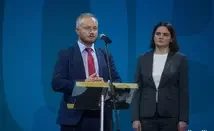Rodger Potocki, director for Europe and Eurasia at the U.S.‑based National Endowment for Democracy (NED), calls Belarusian opposition leaders «desperate, demoralized, and marginalized». Find here some points from his article published by www.tol.cz.
Two major conclusions can be drawn from the local elections held in Belarus on 14 January. The first is obvious: President Alyaksandr Lukashenka has engineered another manipulated and flawed contest. The refusal to include any real opposition representation on election commissions, spurious rejection of many democrats’ attempts to register as candidates, intimidation of campaign figures, routine denial of permission for opposition election events, the alteration of election laws, and the refusal to produce campaign materials, combined to insure that yet another election in Belarus would not be free, fair, or transparent.
However, the regime’s violations of its own election laws, blatant repression and cynical ploys against democrats, as well as the pre‑determined outcome of many of the contests, should not obscure what was also a striking failure of the opposition. After all, it was only a little more than a year ago when the opposition largely united behind a single candidate and worked on his behalf prior to the March 2006 presidential election. The result was the best‑ever performance by an opposition candidate and a real campaign that resonated with significant parts of society. It is important to recall that, in those days, as protest rallies decried the manipulation of the election, the opposition United Democratic Forces (UDF) promised to stay and work together as a coalition to maintain and build on this momentum, and use the January 2007 local elections as another opportunity to reach out to citizens and offer an alternative vision for Belarus.
Sadly, there has been little realization of this sound approach. In the interim, the UDF’s leaders seemed more interested in fighting amongst each other for the coalition’s top position. Anatoly Lebedko, leader of the United Civic Party (UCP), and Sergei Kaliakin, leader of the Belarusian Party of Communists (BPK), clearly envied the domestic and international successes of the UDF’s elected leader, Alyaksandr Milinkevich, and they worked both with each other and separately to undermine his position. Specifically, internal wrangling over the question of whether to hold a new opposition congress, its eventual scope, realignments within the coalition, such as the formation of a «Left Union,» and internal party struggles, most notably in the Belarusian Popular Front (BPF), proved to be more absorbing and satisfying than a genuine united effort to build on the March gains by reaching out to local voters, formulating a common strategy, and taking advantage of breaking issues, such as the Russia‑Belarus «gas war» and a new EU strategy for Belarus. As a result, there was, again, no common effort. As Ales Uladamirski put it on the website of the independent news agency BelaPAN, «the opposition failed to put into practice their key ideas for the elections — one team, one message, one campaign.»
In fact, there was depressingly little effort at all. Finding activists willing to run proved difficult. Even the opposition’s initial claim of 1,000 possible candidates was discouraging, as this hopeful figure amounted to a tiny fraction of those competing for 24,000 open seats. By election day, the survivors found themselves very lonely indeed. Representatives of opposition political parties appearing on ballots totaled barely 100 names.
Few though they were, opposition politicians elected in 2003 were able to raise important issues, hold diverse events, and assist democratic forces in their local communities. Perhaps most importantly, they were the local human face of an otherwise fragmented democratic opposition that is rarely seen or heard in Lukashenka’s dictatorship. These local councilors were the only opposition figures within the state’s power structures.
So what happened this time around? Many opposition figures indicated that they would run, but then weren’t motivated enough to form initiative groups or teams to collect signatures.
Rather than trying to make the most of a difficult situation, parties couldn’t make up their minds whether to participate or not. One foreign observer and former Organization for Security and Cooperation in Europe election‑monitor, noted that «the opposition as a whole is relatively apathetic towards the elections with many opposition leaders only half engaged in the campaign.» One faction of the Social Democratic Party and the Belarusian Party of Communists, advised their candidates to pull out because of the regime’s
violations of electoral rules and practices — as if they had expected
something different.
Lebedko, who is also a leader of the UDF, declared that the opposition movement should not boycott the elections and offer the regime a «cakewalk,» but then pulled out himself. His attempt to clarify the opposition’s position — «there is no strict order to boycott but only a soft recommendation» — just muddled things. At a 4 January meeting, only 10 days before the elections, the political council of the UDF was still not sure whether its candidates should remain in their races. This apathy, indecisiveness, and duplicity insured that the opposition would make no waves during these elections.
What about those candidates who did make an effort? Well, it seemed that many of those democrats elected in 2003, as well as those running this time around, made opposition leaders in Minsk almost as uncomfortable as they did the regime. This was particularly true for the Belarusian Popular Front: many of its candidates from the regions were in conflict with key elements of the party leadership and, in turn, were not supported by them.
In terms of the leadership, Milinkevich’s performance was the best of a poor lot. While he did squander much time, energy, and good will by spending six months in Minsk fighting with the UDF leadership rather than the regime, Milinkevich began trying to do the right thing in the late autumn. Despite running one of the best campaigns of the 2004 parliamentary elections, he was one of very few opposition leaders who chose not to run himself this time around. He at least made an effort to assist those who were trying to fulfill the promises and ideals of March. By serving on initiative groups, collecting signatures, and visiting more than 40 cities and towns in all six regions of the country despite constant harassment by the regime, Milinkevich proved to be the only leader who worked on behalf of candidates from all opposition parties, as well as independents. By acting as a real leader, taking the opposition’s message to the people, and working on an inclusive basis, Milinkevich managed to preserve some of the UDF’s honor.
Despite their agreement to work collectively for the opposition coalition, most other leaders spent the majority of their time in Minsk and traveled only to work on behalf of their own parties. It was a sad return to the disastrous 2004 parliamentary elections, in which party leaders put individual interests above the common good by not dividing districts, not working together, and running democratic candidates against each other.
As Milinkevich pointed out, the 2007 election campaigns also reflected a certain lack of commitment on the opposition’s part.
It is not only the Belarusians who should be blamed. Too many European and U.S. organizations working on election‑related programs have repeated far too often that «there are no longer real elections in Belarus.» This attitude lets Belarusian partners off the hook. Similarly to the 2004 parliamentary election debacle, in which pro‑democratic parties also promised to work together and not to run candidates against each other, Western organizations are not holding their Belarusian partners accountable for promises made and then broken.
After 14 January, it is sobering to reread a Belarusian journalist’s analysis of the opposition’s problems highlighted by the 2003 local elections. Back then, Alyaksandr Klaskouski believed that the opposition was neither psychologically nor organizationally prepared for elections.
«The election campaign reflected problems that have been long known — the weakness of the political opposition, underdevelopment of its regional networks, its alienation from the people and its notorious lack of unity,» Klaskouski wrote. «The opposition failed to agree even on the division of Minsk constituencies so as to avoid rivalry between democratic candidates.»
If the past is any indication, the future does not look very bright. One clear sign of the desperation, demoralization, and marginalization of the political parties is the snap decision by the UDF’s political council to hold an opposition congress in mid‑March. While a new congress could serve as a venue to acknowledge recent mistakes made and pull together, as the October 2005 gathering did, it seems much more likely to be the site of a bitter leadership struggle which will further erode the credibility of parties and the opposition as a whole.
























